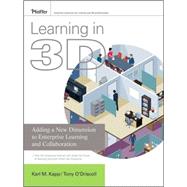
Note: Supplemental materials are not guaranteed with Rental or Used book purchases.
Purchase Benefits
What is included with this book?
Karl M. Kapp, Ed.D., is a professor of instructional technology in Bloomsburg University's Instructional Technology Department and is the assistant director of the Institute for Interactive Technologies. He is a frequent speaker, consultant, scholar, and expert on the convergence of learning, technology, and business operations. He has published hundreds of articles, whitepapers, and industry reports on the topics of organizational learning, instructional technologies, and virtual worlds. He has written several books, including Winning e-Learning Proposals and Gadgets, Games, and Gizmos for Learning and is regularly interviewed by magazine, television, and radio outlets.
Tony O'Driscoll, Ed.D.,is a professor of the practice at Duke University's Fuqua School of Business where he also serves as executive director of Fuqua's Center for IT and Media; a research center dedicated to understanding the strategic, structural, and business model issues emerging from these vibrant and volatile industry sectors. His research has been published in leading academic journals such as Management Information Sciences Quarterly, the Journal of Management Information Systems, and the Journal of Product Innovation Management. He has also written for respected professional journals such as Harvard Business Review, Strategy and Business, Supply Chain Management Review and Chief Learning Officer magazine.
| Foreword | |
| Preface | |
| Acknowledgments | |
| Exploring the Possibilities | |
| Here Comes the Immersive Internet | |
| The Invisibly Pervasive Web | |
| Welcome to the Webvolution | |
| Social Production Comes of Age | |
| The Immersive Internet Singularity | |
| Business Unusual | |
| Learning to Change | |
| Challenging Classroom Captivation | |
| A Preoccupation with Productivity | |
| Seven Scary Problems with the Status Quo | |
| Compounded Marginalization | |
| Networked Learning | |
| Learning to Change | |
| Escaping Flatland | |
| A Brave New Learning World | |
| From Interactivity to Engagement | |
| The Seven Sensibilities of VIEs | |
| Synthesizing the Sensibilities | |
| Implications for Trainers and Educators | |
| Building a Blueprint | |
| Architecting Learning Experiences | |
| Avoiding the Buggy-Whip Experience | |
| 3D Learning Experience Design Principles | |
| Synthesizing the Principles | |
| From Principles to Macrostructures | |
| From Macrostructures to Archetypes and Sensibilities | |
| Achieving Architectural Alignment | |
| Implications for Learning Professionals | |
| Insights from Innovators | |
| Designing by Archetype | |
| Introduction | |
| Creation of the Archetypes | |
| Defining the Archetypes | |
| Instructional Goals | |
| Implications for Learning Professionals | |
| Learning from Experience | |
| Follow the Leaders | |
| Case-Study Format and Questions | |
| Diversity and Inclusion with Virtual Worlds | |
| Experiencing an Inventory Observation | |
| Re-Creating the Kristallnacht Experience | |
| Virtual First-Responder Learning Experience | |
| Virtual Border Service Officer Training | |
| Teaching Rhetoric in a Virtual Environment | |
| Environmental Science in a Virtual Green Home | |
| Creating a Virtual Challenge for Global Graduates | |
| Hosting Virtual Academy of Technology Events | |
| Breaking New Ground | |
| Overcoming Being Addled by ADDIE | |
| Avoiding the Virtual Ghost Town | |
| Development Team | |
| Design Points for Virtual Learning Worlds | |
| Leveraging the ADDIE Model | |
| Step-by-Step Designing Process | |
| Working with a Third-Party Virtual World Vendor | |
| Lessons from the Front Line: How Early Adopters Achieve and Measure Success | |
| Implications for Trainers and Educators | |
| Steps to Successful Enterprise Adoption | |
| Introduction | |
| Diffusion of Innovations | |
| Crafting the Business of Education Case for VIEs | |
| Implementation Considerations | |
| Implications for Learning Professionals | |
| Rules from Revolutionaries | |
| Meet the Revolutionaries | |
| Essay Format and Questions | |
| Essay 1, by Steve Mahaley, Duke Corporation Education | |
| Essay 2, by Karen Keeter, IBM | |
| Essay 3, by Brian Bauer, Étape | |
| Essay 4, by John Hengeveld, Intel | |
| Rules for Revolutionaries | |
| Just Beyond the Horizon | |
| Back to the Future | |
| Introduction | |
| Moving from 2D to 3D | |
| 3D Learning Maturity Model | |
| Conclusion | |
| Campfire 3.0-The Next Generation Collaboration and Workspace | |
| Learning to Be 3D in 2020 | |
| Appendix: Defining Learning in a 3D Virtual Space | |
| Introduction | |
| Convergence of Existing Technologies | |
| Defining Virtual Worlds | |
| Conclusion | |
| Glossary | |
| Notes | |
| Index | |
| About the Authors | |
| About the Contributors | |
| Table of Contents provided by Publisher. All Rights Reserved. |
The New copy of this book will include any supplemental materials advertised. Please check the title of the book to determine if it should include any access cards, study guides, lab manuals, CDs, etc.
The Used, Rental and eBook copies of this book are not guaranteed to include any supplemental materials. Typically, only the book itself is included. This is true even if the title states it includes any access cards, study guides, lab manuals, CDs, etc.